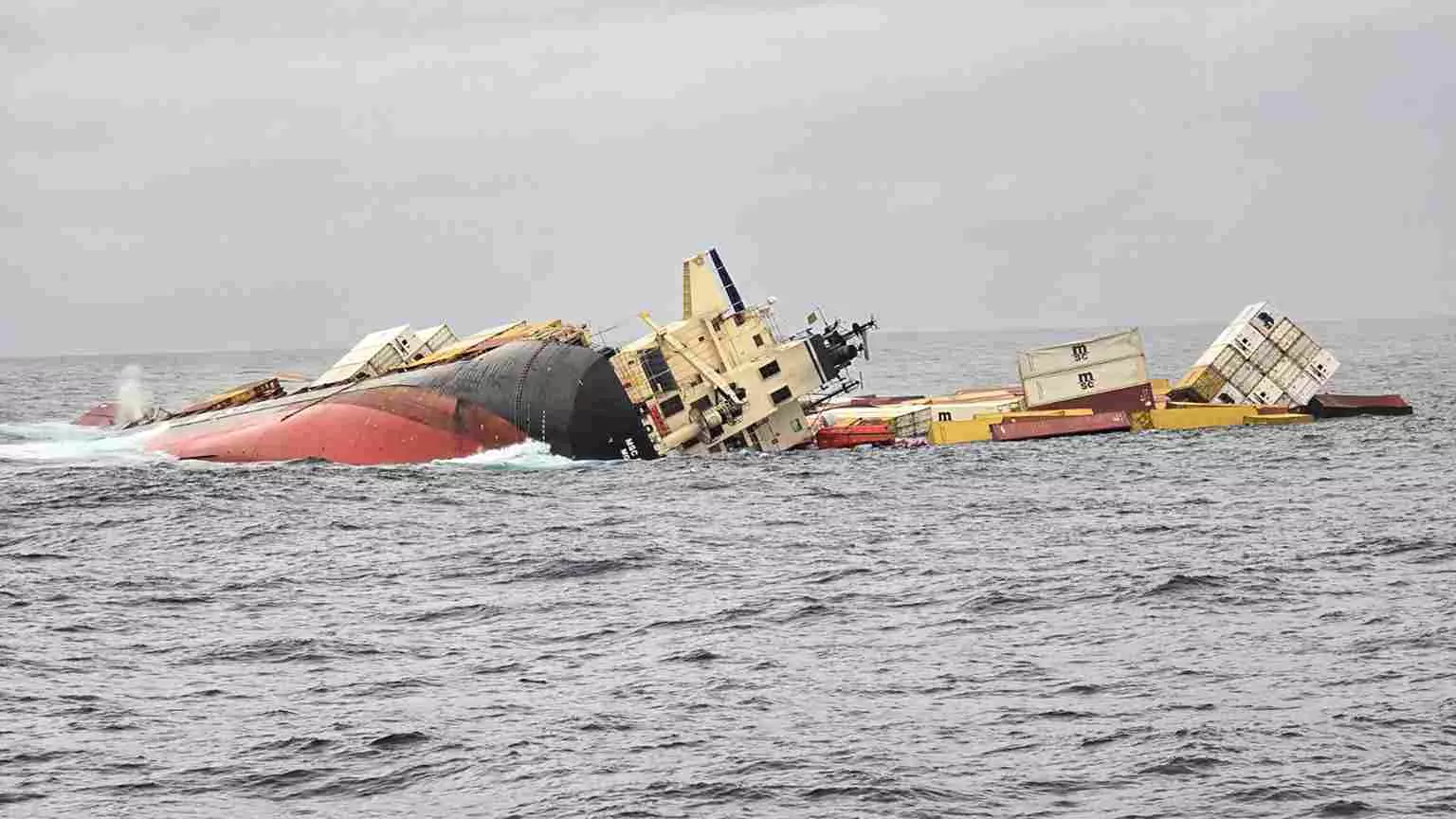
How Kerala is mobilising robust response to cargo ship wreckage crisis
Environmentalists and community leaders have praised the state’s swift response but emphasise the need for sustained action to prevent long-term damage

Kerala has launched a multi-tiered response to tackle the environmental and economic threats posed by the MSC ELSA 3 cargo ship wreckage, which sank 14.6 nautical miles off the state’s coast in the Arabian Sea.
Also read | Kerala govt declares shipwreck off coast a state-specific disaster
The government has constituted specialised committees and appointed key officials to address coastal pollution, negotiate with the shipping company, and assess the disaster’s impact, as debris and potentially hazardous cargo begin washing ashore, threatening marine ecosystems and local livelihoods.
High-level committee
The state has also established a high-level committee, chaired by the secretary of the Science & Technology Department, to oversee pollution control efforts. This body, including representatives from the Disaster Management Authority, Environment Department, Kerala State Pollution Control Board, Indian Coast Guard, and National Center for Earth Science Studies, will issue policy directives, provide resources, and support environmental restoration studies. The director of the environment department serves as the convener, with the flexibility to bring in additional experts as needed.
At the district level, a committee led by the district collector is tasked with immediate action in affected coastal areas, particularly in Thiruvananthapuram, Kollam, Alappuzha, and Ernakulam. Comprising officials from the local self-government, fisheries, ports, and agriculture departments, along with a District Hazard Analyst, this group will remove drifting containers and cargo from the shoreline and implement measures to protect coastal waters from oil and other contaminants. All activities will be thoroughly documented to ensure transparency.
Financial, legal aspects
To address financial and legal responsibilities, a separate committee, chaired by the Additional Chief Secretary of the Finance Department, has been formed to negotiate with M/s MSC, the shipping company.
This team, which includes senior officials from the local self-government, revenue, industries, agriculture, and environment departments, aims to secure funding for damage assessment, management, and compensation for affected communities. The member secretary of the Kerala State Disaster Management Authority will act as the single point of contact with the company and oversee pollution control efforts to ensure coordination.
Multidisciplinary team
Further strengthening the response, the special secretary of the environment department has been named the Principal Impact Assessment Officer, leading a multidisciplinary team from sectors like fisheries, tourism, coastal infrastructure, industries, agriculture, water resources, and local self-government. This team will conduct detailed assessments and collaborate with scientific institutions to guide restoration efforts, emphasizing a science-driven approach to eco-restoration.
Also read | Kerala: Containers from sunken Liberian ship wash ashore, triggering fresh concerns
Additionally, the secretary of the Science & Technology Department has been designated as the principal advisor to the environment department, supported by a member of the Kerala State Disaster Management Authority. This advisory role will guide the Pollution Control Board and district administrations in combating environmental damage and restoring ecosystems affected by the wreckage.
Environmental concerns
The MSC ELSA 3 wreckage has sparked alarm among coastal communities, with fishermen reporting debris washing ashore, threatening fishing grounds and livelihoods.
The potential for oil spills or hazardous material leaks has raised concerns about long-term environmental damage to Kerala’s pristine coastline, a critical economic and ecological asset. Local businesses, particularly in tourism and fisheries, fear significant losses if the crisis is not swiftly addressed.
The government’s actions follow its declaration of the MSC ELSA 3 wreckage as a state-specific disaster on May 29, 2025, recognising its severe environmental, social, and economic implications. This declaration enabled the rapid mobilisation of resources and the formation of the committees announced today. The state’s proactive measures reflect the urgency of protecting its coastal communities and ecosystems from the disaster’s fallout.
Coordinated governance
Kerala’s response is a model of coordinated governance, blending scientific expertise, local action, and financial accountability. The state-level committee ensures strategic oversight, while district teams tackle immediate challenges on the ground. Negotiations with M/s MSC aim to hold the shipping company accountable for the wreckage’s consequences, including compensation for affected communities.
Also read | Kerala rushes to contain environmental, economic risks after sinking of container ship
Meanwhile, the impact assessment team’s collaboration with research institutions underscores Kerala’s commitment to evidence-based solutions. As debris continues to drift toward the coast, the government is urging residents to report sightings to local authorities to aid cleanup efforts.
Sustained action needed
Environmentalists and community leaders have praised the state’s swift response but emphasise the need for sustained action to prevent long-term damage. “The wreckage is a wake-up call for stricter maritime regulations,” said a local fisherman from Alappuzha. “We need to protect our seas and livelihoods.”
With its multi-pronged approach, Kerala is working to contain the crisis, restore its coastline, and support affected communities. The coming weeks will test the effectiveness of these measures as the state races to mitigate the environmental and economic toll of the MSC ELSA 3 disaster.

